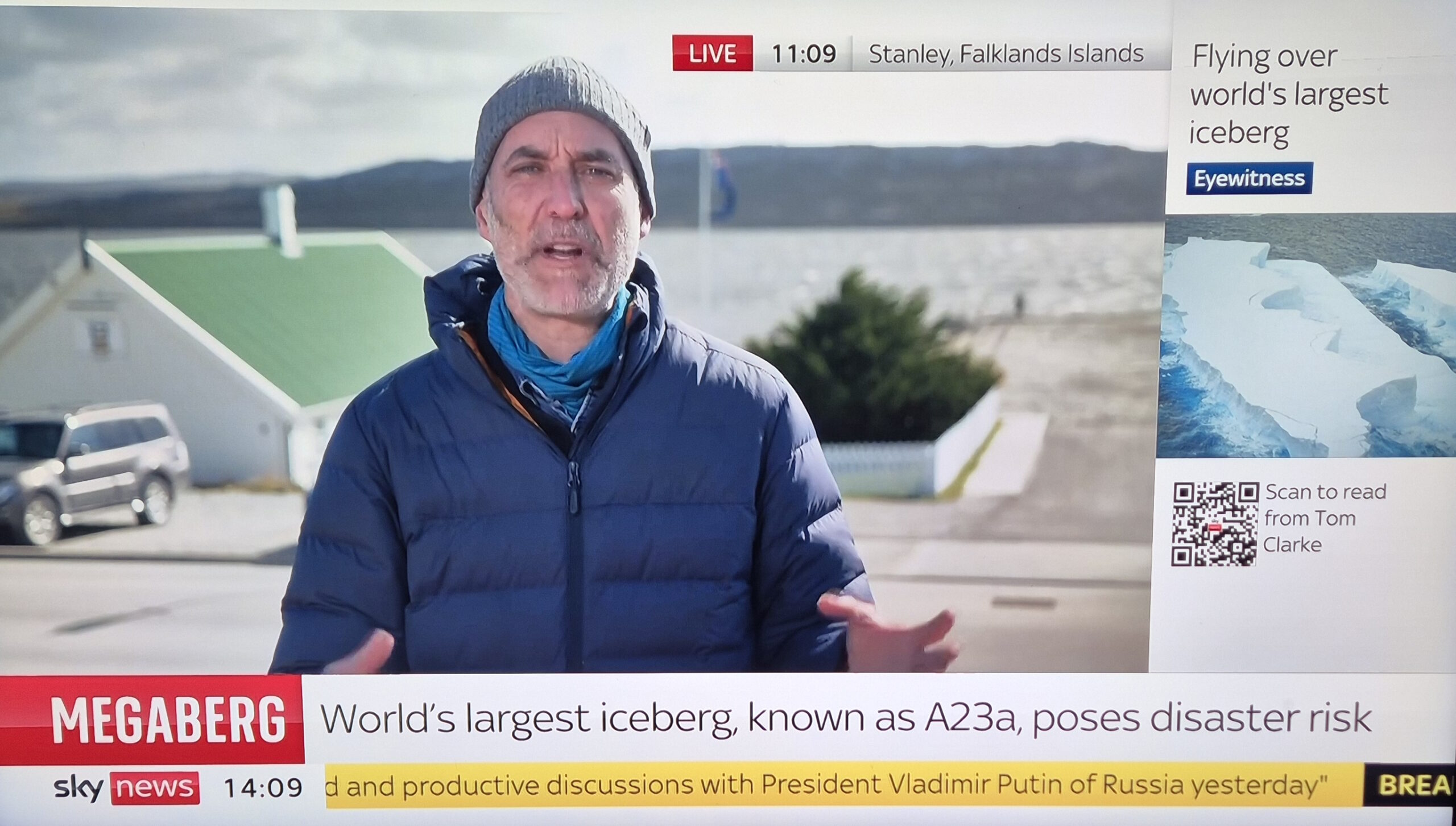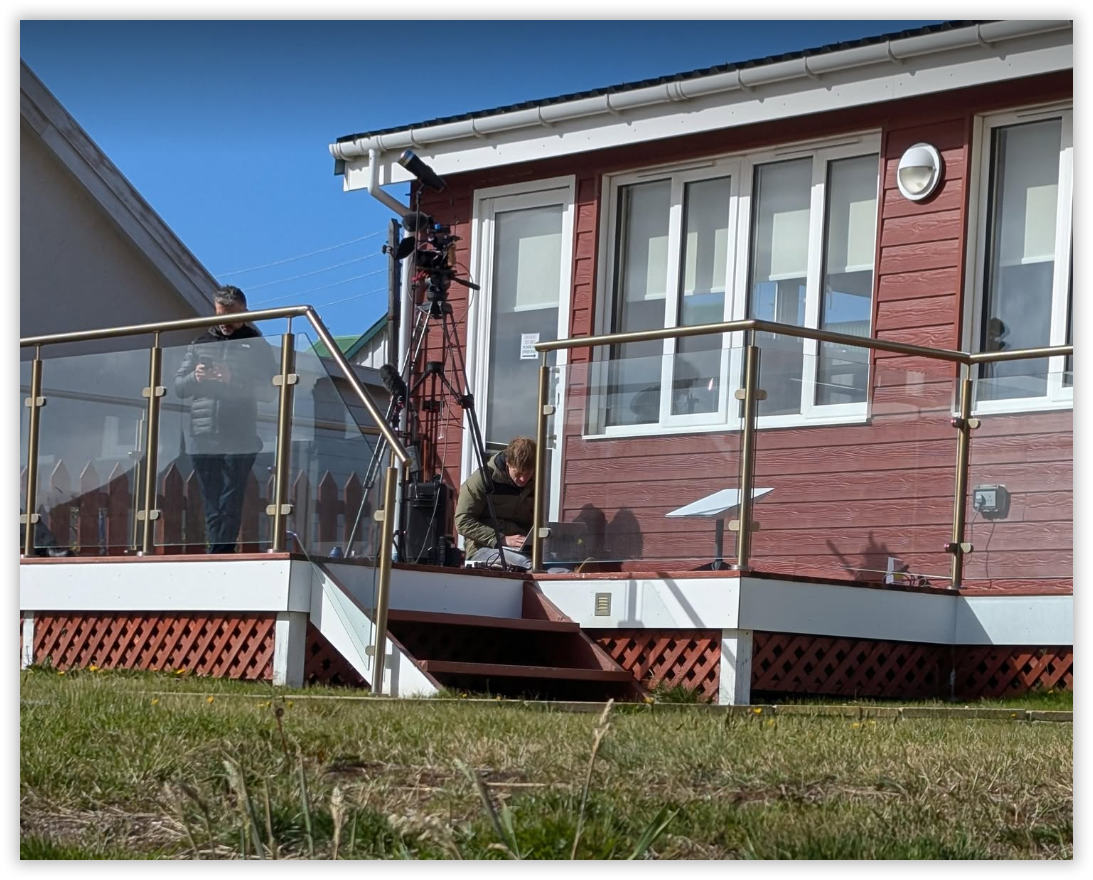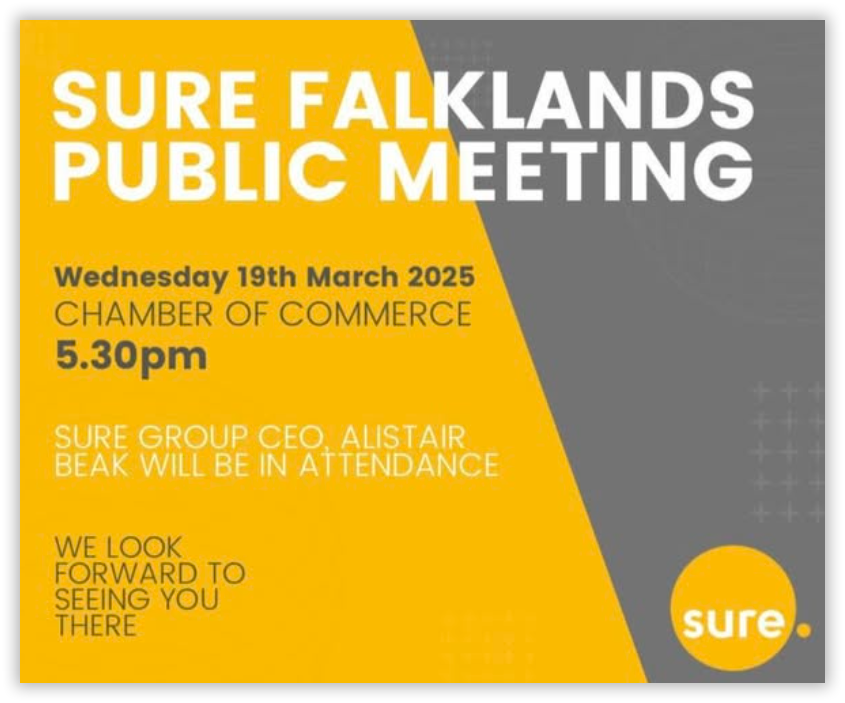 Tom Clarke of Sky News in Stanley
Tom Clarke of Sky News in Stanley
This is the latest update in the long process of gaining approval for the use of Starlink in the Falkland Islands following the Executive Committee (ExCo) meeting in early March 2025. More on that meeting can be seen in this post – Falkland Islands Government Greenlights Starlink.
March 7th 2025: Comment on the ExCo approval by Brian Jamieson of the Starlink Petition Group and MLA Roger Spinks (Source FITV)
March 7th FITV interviews
 March 10th 20125: The Falkland Islands Government issued a press release:
March 10th 20125: The Falkland Islands Government issued a press release:
VSAT Public Consultation Launched
“The Falkland Islands Government (FIG) is seeking views from the public on the proposed changes to the policy that guides the issuing of VSAT licences and the associated fee level.The proposed changes were recently considered by Executive Council in response to the community petition and Select Committee process that took place last year.
The public consultation is specifically on the sections of the current policy that FIG believes need to be updated to allow for VSAT licences to be issued on the terms recommended by the Select Committee – that is, less strict application criteria, and cheaper for the applicant.
This consultation is not about any particular provider – the policy applies to anybody applying for a VSAT licence, whether that is to allow them to access Starlink services or any other VSAT services. This means that this consultation isn’t about ‘allowing’ Starlink. Separate work is being done by the Regulator to process an application from Starlink, if they choose to apply.
The consultation will remain open for 5 weeks, from 10 March to 11 April 2025.”
Note: Please remember that the consultation is for Falkland Islands constituents only.

Proposed new policy text |
What does this mean? |
| There are certain circumstances where the Government not allowing individuals to make personal arrangements could be said to be unlawful. The Government also recognises that the balance is no longer in favour of a single supplier of internet services, as resilience within internet service provision is a significant risk mitigation against the possibility of service disruption. | This section acknowledges the changes in technology and people’s reliance on internet services, since the setting of the original policy. It establishes for the first time that the availability of VSAT services is a part of overall resilience for the Falkland Islands. |
| The Government considers it reasonable that there is an alternative to using the exclusive provider in circumstances outlined in this policy. It is nonetheless appropriate that anyone managing telecommunications is within a consistent licensed and regulated regime. The Government remains aware of the opinion that suggests a failure to recognise this possibility in legislation may be unconstitutional. | This section re-confirms that any and all providers of VSAT services should be regulated appropriately within the Falkland Islands. This means having to apply to operate here and comply with any regulatory terms. |
| The Government recognises that the development of services available via VSAT operators since the original policy was set in 2016 represents a functionally different service from that available when the original policy was established. In the context of this, it is understood that a resident may wish to set up operations outside the parameters of the universal service obligation which is imposed on the exclusive provider. This may include a resident requiring a specific level of bandwidth, speed or latency not available commercially, or at a reasonable price, from the exclusive provider, or via, the exclusive provider. | This section confirms that the exclusive provider retains their exclusivity but that there are circumstances where residents can reasonably expect to use another provider to access other services or to achieve a different setup (speed, individual earth station availability, latency etc) than is available from the exclusive provider. The list of circumstances for wanting a VSAT service is not exhaustive, it is just there to illustrate the sort of areas that might apply. |
| The Government additionally recognises that the needs of the people of the Falkland Islands for self-provision of services via VSAT providers has been demonstrated by the community petition 2024, in particular the evidence about those needs, including that presented to the resulting Select Committee. The Government’s proportionate response is to allow for all residents who demonstrate, by way of an application for licence, that they have needs not provided by the exclusive provider, to be able to self-provide, subject to receipt of and compliance with the terms of a licence from the Regulator. | This section confirms that ‘needs’ will be adequately demonstrated by the filling in of an application form and expressing willingness to meet the fee level and other regulatory compliance requirements. This removes the previous requirement to consult with the exclusive provider. |
| Before granting any such licence, the Regulator must be absolutely satisfied that the grant will be consistent with the regulatory principles and the electronic communications objectives, which are now considered to support access to self-provision within the terms of this policy. | This section sets out that the interpretation of the electronic communications objectives has changed to accept personal use of VSATs, and the resilience to overall communications they offer, is in line with the objectives. |
| In accordance with the above it is clear that any licence should not be incompatible with the exclusivity afforded to the exclusive licensee. Therefore, only “personal use” of VSAT services (as defined in this policy) will be permitted. Any licence granted will be only for the personal use of the licence holder. This definition includes a business using the licence for internal operations such as the running of an office or premises, but excludes providing services under that licence to any third-party (e.g. tenants, customers or the public) whether paid for or freely provided. | This section confirms that any non-personal use of VSAT services remains under the exclusive licence, and this cannot be unilaterally amended by FIG. “Personal use” includes an individual or household, or a single business providing internet services only to employees for the carrying out of their work. However, a business wishing to provide internet services to customers, tenants or the public, whether free or paid, cannot be granted a personal licence. They would need to use services provided by the exclusive provider, currently Sure. |
| The Regulator must be satisfied that the licence will be complied with and that there is no intention to provide a service via the self-provision which could fall outside of the definition of “personal use”. In any decision making the regulator will be guided by the statutory objectives and principles referred to above. | This section is re-confirming the clarity of the term “personal use” and how the Regulator will consider applications for VSAT licences. |
| These parameters having been established, the next question is what licence fees and other terms should apply to this extraordinarily licensed use. | Fee levels are only considered once all of the basic principles above have been established. The above will apply regardless of the fee level set. |
| Not every telecommunications service is wholly within the exclusivity granted to the current exclusive licensee. Operating outside the exclusive licence regime is allowable in law, but could create a commercial pressure for the exclusive licence provider, which in turn could disadvantage the general public interest as collective purchasing provides benefits for the population at large. However, the demonstrated need of the people of the Falkland Islands for services available through VSAT providers makes this impact reasonable, and the risks are mitigated by the resilience provided by availability of alternative services. Risks of impact are also mitigated by the ability of the Government to respond to commercial pressure, to ensure continuation of the universal service by taking such corrective action as it considers appropriate. | This section is key to the relationship between the exclusive licence and the allowable issuing of VSAT licences. While there is confidence in FIG’s ability to provide licences for VSAT service operators within the Communications Ordinance, FIG also recognises that this is a significant change to the circumstances that existed when the exclusive licence was signed. The impact on Sure will be a commercial one, and FIG wishes to ensure the continuity of services provided by Sure. FIG recognises that not everyone will wish to apply for a VSAT licence and that most Falklands residents rely on Sure’s telecommunications services. This section is to confirm in policy that the impacts of changing the VSAT licence terms must be monitored and, if required, mitigated. |
| The starting point for fees is therefore the annual sum of the lowest commercially-available package available at the time this policy is adopted. This is £15 a month, making the licence fee for a licence £180 a year. This fee should be subject to annual review. | This fee level was that suggested by the petition and Select Committee. It also accords with FIG’s “user pays” principle. Estimates of likely applicant numbers have been offset against the costs to FIG of running the regulatory service. It is considered right that successful applicants should cover the costs of providing this service, rather than this cost being applied to all taxpayers, which would be the case if a lower fee level were adopted. The annual review is to allow FIG to re-assess the user pays principle against actual applicant figures and adjust as necessary. |
| In setting this fee, the Government acknowledges that within the exclusive licence holders’ arrangement there may be a data allowance included (as is currently the case) but this will be disregarded in setting the fee. It is recognised that, in operating an alternative system, a VSAT licence holder would have to pay for data under their own arrangements. | This section confirms that aligning the fee level to the lowest Sure package is a proxy measure, not suggesting that there is an equivalent service level provided – VSAT licence holders will have to separately pay for any VSAT services, and cannot claim any of that cost is covered by the licence fee. |

 Tom Clarke in Stanley
Tom Clarke in Stanley
 The Sky News camera team at the Malvina Hotel
The Sky News camera team at the Malvina Hotel


An update
Becky Clark, Director of Development and Commercial Services, described the role as follows:
“Chris has been retained by the Falkland Islands Government to act as a ‘critical friend’ to the Future Telecommunications Project. He will use his expertise in telecoms and his knowledge of the Falkland Islands to confidentially input into and review selected reports produced by FIG and its telecommunications consultants, providing an extra check and balance on options and ideas as Executive Council takes key decisions on the post-licence period.”

Chris Gare, OpenFalklands March 2025, copyright OpenFalklands
